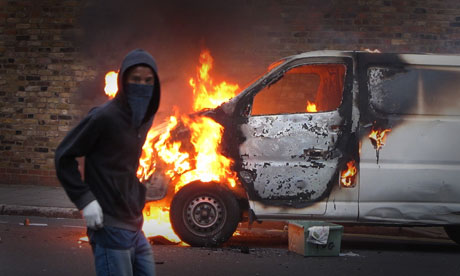 Unicef has criticised the UK judicial system for locking up children allegedly involved in the August riots and warned ministers that they are likely to be in breach of their UN obligations to children's rights.
Unicef has criticised the UK judicial system for locking up children allegedly involved in the August riots and warned ministers that they are likely to be in breach of their UN obligations to children's rights.The UN children's fund said official figures showing that 45% of all under 18s detained on charges of rioting and looting had no previous criminal history were "very worrying", and represented a possible breach of the 1989 UN convention on the rights of a child.
The agency is tasked with upholding the international treaty which Britain signed up to in 1991.
Under article 37, remand must only be used as a last resort in criminal proceedings, where there are no alternatives to stop a child reoffending.
Two other UK-based agencies, the Howard League for Penal Reform and the Children's Rights Alliance for England (CRAE), said they believed custodial arrangements, especially for children who had not yet been put on trial, breached the convention.
The latest Ministry of Justice figures show that more than 40% of the 269 children whose court hearings were not completed by mid-September were remanded in custody. This compares with an average remand rate of 10% last year.
Of those on remand, 60% had no previous convictions and 45% had had no contact with the judicial system at all, including official reprimands or warnings.
Despite declining rates of child incarceration rates, UK agencies warned that Britain still imprisoned more children than any other country in western Europe and after the riots the child population in prison jumped by up to 8%.
Remand figures reveal wide regional variations. Only one of the 50 youths awaiting sentence in Manchester was remanded in custody, while in London the figure was 85 out of 219. Of the children bought to court for riot offences, 90% were male.
Unicef's UK branch said in a statement: "The UN convention on the rights of the child [CRC] is clear in article 37 that the detention of children should only happen as a last resort in criminal proceedings. The fact that 45% of the children detained on charges of rioting and looting are completely unknown to the UK's criminal justice system is, therefore, very worrying.
"People who were assaulted, mugged or whose property was destroyed by the rioting will have been scared and know that their rights have been badly violated. However, our justice system must not violate the rights of children in response to these terrible events. It is vital that it adheres to the CRC when considering the punishment of children who commit crimes."
The Unicef statement continued: "We believe that society needs to understand the deeper causes behind the involvement of children, not simply blame them. Far from being a cause of antisocial behaviour, we believe that respecting rights builds strong societies, strong values and citizen engagement.
"We must also make sure that following any criminal punishment the children concerned are helped and supported to return to their communities and develop into adults who contribute to our society not become repeat offenders."
"The riots are a concern and responsibility for us all. We urge those in charge of responding to the riots not to blame children's rights, but to respect them."
Without a full legal review, Unicef said it would not be able to determine whether the UK was in an official breach of the convention, but the organisation's 2008 report on child detention in the UK was highly critical, saying that high rates of detention and remand represented failures to fully implement the CRC.
Commenting on the Unicef report, the director of campaigns at the Howard League, Andrew Neilson, said that his organisation believed that the UK government was in breach of the convention.
"It is very hard to see how a fourfold increase in the use of custodial remand can be squared with our commitment under the UN convention to use custody for children as a last resort," he said.
"Children are by definition vulnerable in prison, and those on remand even more so. We should not disregard the fact that these children are innocent unt il proven guilty, and even if convicted many would not expect to receive custodial sentences," he said.
Carolyne Willow, the national coordinator for CRAE and an expert on the convention also believed that Britain was in breach of its obligations. Since the UK was a signatory but had not brought the convention into statute, however, there was no legal recourse for children failed in this way.
"The UK is on the worst child incarcerators in the western world … Last year, 75% of children in custody were incarcerated for offences that did not involve violence against the person," she said. "We shouldn't let all the tough-talking distract us from ministers' obligations under international law and the fact that children who end up in custody are among the most disadvantaged in our country."
A Ministry of Justice spokeswoman said: "Sentencing is a matter for the independent judiciary … When custody is used, it is generally as a last resort for the most serious or persistent young offenders where it is necessary to protect the public.
"To provide a consistent base for these decisions an independent body of experts, the Sentencing Council, set guidelines for them to use."
The MOJ spokeswoman added that new legislation was also underway to help tackle the problem: "We are taking forward measures in our Legal Aid, Sentencing and Punishment of offenders Bill to restrict the use of remand for those young people unlikely to receive a custodial sentence if convicted."
Origin
Source: Guardian
No comments:
Post a Comment